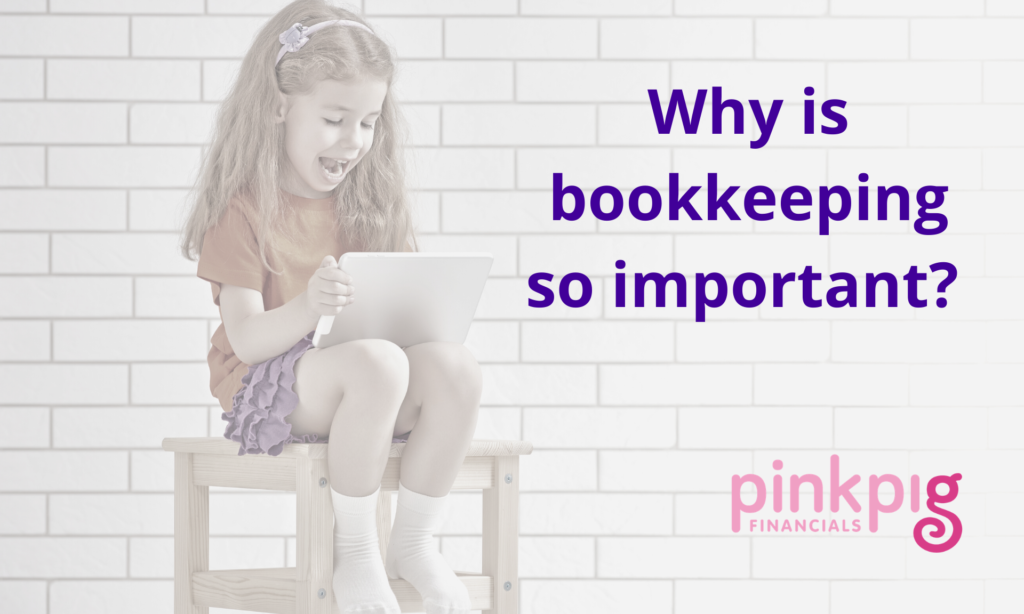 I guess I should throw in a little warning to start with – this is longer than my usual blogs – but such an important topic deserves to be explored thoroughly. So grab a cuppa and have a read while we explain why bookkeeping – and more importantly good bookkeeping – is so important for your business.
I guess I should throw in a little warning to start with – this is longer than my usual blogs – but such an important topic deserves to be explored thoroughly. So grab a cuppa and have a read while we explain why bookkeeping – and more importantly good bookkeeping – is so important for your business.
We often refer to your bookkeeping as the foundations for your financials. Therefore just like a house needs foundations to build on, it is crucial that your bookkeeping is up to date and is accurate.
Good bookkeeping records will give you reliable and meaningful information enabling you to understand your business and make the decisions you need to.
It will help you to know where you are in relation to your goals – how do you know how far you need to go if you don’t know where you are right now?
And finally, good bookkeeping records will also mean that things like cash flow forecasting and credit control (and more!) can be carried out. For example, we certainly can’t chase for money when we don’t know what is and isn’t paid! To put it basically, without good bookkeeping nothing else can be done.
If you’re thinking of doing your bookkeeping yourself here are some things to consider and watch out for.
How much time will it take you?
We often hear clients say they’ll do the bookkeeping themselves to keep costs down – but realistically how much time is this going to take? Something that could take us as trained bookkeepers a few minutes to do, could take you hours. Is this a good use of your time or could your time be better spent elsewhere in your business? Like generating income or servicing customers?
How often will you complete your bookkeeping?
Following on from the point above we quite often see clients let the bookkeeping build up as they don’t have the time to keep on top of it. And we all know, the more something builds up, the more we dread doing it! Not to mention it’s not an exciting part of the job either so I’m sure many business owners find many excuses to put it off as long as possible!
Not only will this lead to anxiety and dread of doing it, but it will also mean that your data is then out of date. How can you make a decision on hiring a new employee for example, if you don’t know your sales figures for the last few months, and therefore if you can actually afford them or not? The more up to date it is, the more it can tell you about your business.
Your accountant cannot prepare your monthly management accounts if your bookkeeping is not complete to month end. The same goes for your VAT return, and your accounts. Not only will this cause delays, and frustration (on both sides – we hate chasing you as much as you get annoyed with us chasing you!), but it could mean you’re unable to make that timely decision, you’re charged additional fees (especially if it means your accountant needs to drop everything and work round the clock at the last minute to deliver), or you could even end up being late filing a return and receiving penalties from HMRC and/or Companies House.
I feel this point could actually be a blog itself as up to date books really are key. But one more huge point to note is that the more up to date your accounts are, the quicker we can do your accounts at year end.
Let’s say you’ve found that perfect house and you need to get a mortgage approved to put in an offer as soon as your financial year ends. If your bookkeeping is all up to date we can then get your accounts done and the information over to your mortgage broker within a few days.
Not to brag, but our record is actually having the accounts prepared, signed off and filed within 36 hours of year end! We’d been working with a client, and knew this was required, and made sure everything was in place to complete as quickly as possible to secure their dream home. But without the bookkeeping being up to date this would have been impossible. (On that note, please do tell your accountant about plans like this so we can plan and prepare accordingly rather than doing it in a panic at the last minute, thank you. 😉) Plus, the sooner we know this is a goal the better we can advise you and help get your accounts to where they need to be.)
At PPF we aim to complete our client’s bookkeeping on a daily basis, so they have the required information at their fingertips when they need it. I’d recommend if you are going to do it yourself to do it weekly, monthly at most – certainly not leaving it until the day before your VAT return is due or your accounts need filing!
Your bank account(s) don’t balance
So you’ve got to the end, added everything to Xero, reconciled your bank and the balance showing on Xero doesn’t match what your bank statement says – argh!!!! This is actually quite a common issue, and could be a fairly simple fix, or could be a huge thing to put right, or anywhere in between!
There are many reasons why this occurs – you may not have inputted the correct starting balance, the feed may have dropped out for a few days or there could be duplicated some transactions. We also see people delete transactions that are personal, or add in transactions that have not actually gone through your bank – or have marked a bill/invoice as paid, but also reconciled using the spend/receive money function so duplicated the transaction.
However it has happened, the problem will need to be found and resolved before year end can be completed – and is extremely important when doing cash flow forecasting – how can you forecast your cash flow when the bank balance isn’t even correct?
Missing transactions/bank accounts
 We quite often find things are missing when we come to do year end – either whole bank accounts (ie that savings account set up for tax savings), or certain transactions. It could be things like something you’ve paid for personally and not included. Or even a sales invoice raised via your sales management software that’s not been uploaded to Xero, or similarly with purchase invoices not received or just not added as they haven’t been paid yet.
We quite often find things are missing when we come to do year end – either whole bank accounts (ie that savings account set up for tax savings), or certain transactions. It could be things like something you’ve paid for personally and not included. Or even a sales invoice raised via your sales management software that’s not been uploaded to Xero, or similarly with purchase invoices not received or just not added as they haven’t been paid yet.
Incomplete records not only give you an incomplete picture of your finances, they will also mean incorrect accounts and tax returns. Your accountant should be looking out for the ‘usual’ type of things that are missing, but this could then cause a delay going back and forth and adding these in.
And while we’re on the subject of missing things – uploading your receipts/purchase invoices to Xero (via Dext Prepare) helps keep everything in one place, will stop your accountant asking questions that could easily be answered by looking at the receipt and will also make any inspections a breeze! Having the receipt right there with the transaction is super handy, and we do get rather frustrated when it’s not there and we need it!!
Incorrect/inconsistent classification of expenses
We quite often see expenses classified incorrectly, or many just lumped in to ‘General Expenses’, and this will need resolving to get a clear picture of where your money is going, as well as to enable your accountant to do your management accounts or year end accounts.
Another big problem we see is expenses like small computer or office equipment (ie a keyboard or a kettle) being classified as an asset, when it should actually be an expense. And visa versa. Now this may not sound like a huge issue – but the accounting treatment is different, and sometimes the tax treatment too. Read more on this here.
Another issue we see is inconsistent treatment – so say your Canva subscription – this feasibly could come under marketing (as it’s used to create marketing materials), or IT Software (as it is cloud software) or subscriptions (as it’s a monthly subscription to the software). All 3 are correct – but should be applied consistently once you set a policy on where to allocate it. Again, may not seem a huge issue – the end result is the same no matter where you put it right? But when you’re comparing month on month it’s good to have everything in the same place to really understand where your money is going, and to spot any issues, like duplicate payments. Defaults are a great way of helping with this.
Incorrect VAT treatment
Are you splitting out the VAT where you need to? Are you using the correct rates? Do you have the correct receipt to back up your treatment? (Wondering what receipts you need? Check out our blog)
So you could be claiming VAT back where you shouldn’t and therefore will need to pay back to HMRC. Or not claiming it back where you should have and therefore missing out on claiming it back.
If you’re doing your own VAT returns, you could therefore be submitting incorrect returns – and down the line, you may receive penalties for incorrectly claiming where you shouldn’t. I’m sorry to say it’s not just the click of a button like some green software companies would lead you to believe.
If your accountant prepares your returns they’ll pick up the errors, but depending on the amount of errors could end up charging you more to correct these for you.
Mixing business with personal
We quite often see personal expenses put through the business where they shouldn’t be. Whilst it’s not ideal to use your business card for personal expenses we’re not silly to think it doesn’t happen – you just need to account for it correctly.
We quite often see things like car payments (personally registered & contract) or family meals, excessive subsistence, personal tax payments, clothing, Amazon Prime TV downloads, music downloads and so on, showing as expenses when they are actually personal costs.
Why not download a copy of our expenses guide going through everything you can and can’t put through your business? Just click on the image to your left!
Any personal expenses that do go through the company should be put to Directors Loan Account and either repaid or dividends voted to cover these.
Could doing it yourself cost more than you think?
And it’s not just a case of the better the records the better the information you have is. At PPF the better your bookkeeping, the cheaper your year end accounts will be too! We base our VAT and accounting fees (in part) on the quality of your Xero records using our Xero Health Check report.
If you’re doing your own bookkeeping we don’t expect it to be perfect (we know we’re the ones who spent years training in bookkeeping & accounting not you!), and we know there will be some degree of correcting and tidying to get the records to how we need them to prepare your year end. So we build this into our fees to cover some of the corrections we mentioned above.
Sometimes though, the errors are so big that we need to spend a lot of time (more than we’ve accounted for in our fees) and will need to charge even more to fix it – and trust me, we really don’t like coming back to you and saying we need to charge you more.
We do provide training, and work with you to improve your bookkeeping skills, but sometimes the fact is we just need to take it over and do it for you, and this will be your cheapest option – in both money terms, and alleviating some stress. After all – you didn’t set up your business to spend hours stressing about your bookkeeping – but we did!
What is a Xero Health Check?
Our health checks look at a number of the factors we mention above, and help to build a picture of the quality of your records – and how useful they are to you for the information you need, and to us for preparing your accounts and management reports etc.
Watch our video below to see more on the reports – and download a sample report here.
For just £99 plus VAT we’ll connect up your Xero to our software and provide you with your own health check report, along with suggestions for improvements to both your bookkeeping and payment services.
Why not get a Xero Health Check to see how your bookkeeping scores? Drop us an email on hello@pinkpigfinancials.co.uk to request yours.
Or if you’d rather us just take your bookkeeping on you can read more about our bookkeeping service here, or if you’ve heard and read enough click below to get started – simply complete the quick questionnaire and at the end there will be a link to book a discovery call.


